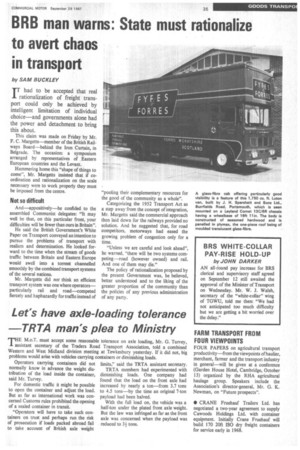BRB man warns: State must rationalize to avert chaos in transport
Page 37

If you've noticed an error in this article please click here to report it so we can fix it.
by SAM BUCKLEY
rhad to be accepted that real rationalization of freight transport could only be achieved by intelligent limitation of individual choice—and governments alone had the power and detachment to bring this about.
This claim was made on Friday by Mr. F. C. Margetts—member of the British Railways Board—behind the Iron Curtain, in Belgrade. The occasion: a symposium arranged by representatives of Eastern European countries and the Levant.
Hammering home this "shape of things to come", Mr. Margetts insisted that if coordination and rationalization on the scale necessary were to work properly they must be imposed from the centre.
Not so difficult
And—appositively—he confided to the assembled Communist delegates: "It may well be that, on this particular front, your difficulties will be fewer than ours in Britain".
He said the British Government's White Paper on Transport conveyed an intention to pursue the problems of transport with realism and determination. He looked forward to the time when the stream of goods traffic between Britain and Eastern Europe would swell into a torrent channelled smoothly by the combined transport systems of the several nations.
Mr. Margetts did not think an efficient transport system was one where operators— particularly rail and road—competed fiercely and haphazardly for traffic instead of
"pooling their complementary resources for the good of the community as a whole".
Categorizing the 1952 Transport Act as a step away from the concept of integration, Mr. Margetts said the commercial approach then laid down for the railways provided no solution. And he suggested that, for road competitors, motorways had eased the growing problem of congestion only for a time.
"Unless we are careful and look ahead", he warned, "there will be two systems competing—road (however owned) and rail. And one of them may die."
The policy of rationalization proposed by the present Government was, he believed, better understood and to the liking of the greater proportion of the community than the policies of any previous administration of any party.
A glass-fibre cab offering particularly good visibility is a feature of this 1,750 Cu. ft. Luton van, built by J. H. Sparshatt and Sons Ltd., Burrfields Road, Portsmouth, which is seen mounted on a Leyland Comet 13C/6R chassis having a wheelbase of 16ft 11in. The body is constructed of seasoned hardwood and is panelled in plymax, the one-piece roof being of moulded translucent glass-fibre.




































































































































































